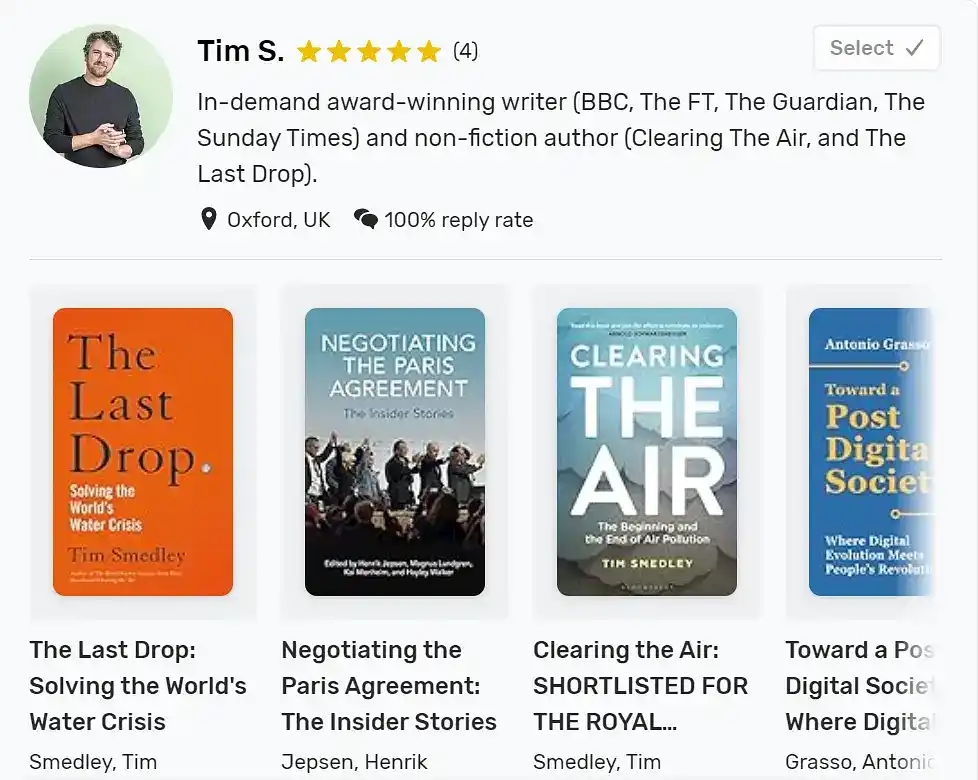Blog • Understanding Publishing
Last updated on Oct 14, 2025
The 6 Best Ghostwriting Companies to Write Your Book
Dario Villirilli
Managing Editor of the Reedsy blog, Dario is a graduate of Mälardalen University. As a freelance writer, he has written for many esteemed outlets aimed at writers. A traveler at heart, he can be found roaming the world and working from his laptop.
View profile →Do you have a book idea but lack the time or patience to write it yourself? One solution is to hire a ghostwriter — a trusted author who can write the book on your behalf while you retain the credit.
Hiring a ghostwriting agency is a major decision, both in terms of financial investment and the impact it can have on your project. In this post, we share some of the best ghostwriting services available while also providing tips to help you steer clear of the less reputable players that unfortunately exist in this market.
The 6 best ghostwriting services
The core mission of ghostwriting companies is to provide authors with their ideal writing partner: a ghostwriter who can masterfully capture the author's unique voice and storytelling style. Whether you need assistance fine-tuning an existing draft or writing a book from scratch, here are the best services on the market.
1. Reedsy
⏳ Founded in: 2014
📚 Genre: Fiction, Nonfiction
💰 Price: Starts at $3,500 for Fiction, $6,500 for Nonfiction
Reedsy is a curated online marketplace that connects authors with the finest publishing professionals around the globe.
Q: What methods do you use to capture a client’s voice in your writing?
Suggested answer
Capturing a client’s voice is one of the most important aspects of ghostwriting. Here's what I do:
1. A detailed onboarding questionnaire.
Every new client completes a style/voice questionnaire that asks:
- What books would you want yours compared to, and why?
- Who are your favorite authors for prose?
- What five adjectives would you use to describe this story?
This gives me a clear starting point for tone, rhythm, and narrative personality.
2. A dedicated Zoom or phone call to discuss voice and style.
It’s often easier for clients to articulate their preferences out loud, and I listen closely for word choice, pacing, and the kinds of metaphors or examples they naturally gravitate toward.
3. An optional sample draft after outlining.
Once we’ve created the project outline, I may draft a short sample section in the proposed style. This gives the client an opportunity to confirm that the voice feels authentic before I proceed with the full manuscript.
Michelle is available to hire on Reedsy ⏺
Capturing a client's voice starts with listening. Effective listening is fueled by curiosity and empathy. Authentic curiosity allows me to listen with real interest. As I saturate myself in the clients' ideas and stories, I grow to empathize with them. From this soil bloom the final words on the page--from pacing to word choice to style. As a ghostwriter, my focus on attentive listening means I rely heavily on interviews. I take extra time to converse with my clients and build rapport, so we can discover their writing-style identity identity together--because it all starts with their voice.
Mark is available to hire on Reedsy ⏺
Great question! The interview process is the first step. You're not just collecting the material for the book, you're also tuning your ear to their modes of speech. These days too - depending on the project - I use AI to transcribe the interviews, but AI can't manage every accent, so I always run through the transcripts a second time to make sure that they're accurate, and that process again sinks the client's voice deeper into my subconscious. So when it comes to the writing stage, I'm super-familiar with the client's idioms and vocabulary, so I can write away naturally in their voice.
John is available to hire on Reedsy ⏺
Every ghostwriter has their own tricks on how to capture the voice of an author while writing. I’m a big stand-up comedy fan, so I like to think of myself as doing an impression of the author as I write. Many of the best impressionists–Dana Carvey is my favorite–usually have a word or a phrase that gets them into the character. I try to do the same with my clients. Sometimes it’s not even anything spoken. I can imagine the person on a stage gesticulating, for example, to help me get into their voice.
But I think beyond those tricks, we can put a little more structure to the process of “voice." By breaking down what voice is, we can help to elevate it for our clients and reach the level of a true collaboration.
I tend to approach capturing voice with three different components, which I walk through with each of my clients:
- Structure: Some authors will have different sentence structures than others. Some may like having short, declarative sentences or paragraphs, vs. long ones with lots of detail. Can I use conjunctions or not? Do you want to ask the reader a lot of questions, or be more declarative? Do you want to use bulleted or numbered lists, or rely more on paragraph flow?
- Tone: This is probably the component most closely resembling what clients mean when they talk about “voice.” This is the feeling readers get as they read the writing–the more “art” than “science” component of the manuscript. But even tone has some standard components to discuss with a client: Should the language be formal or informal? (This relates to the conjunction question, above.) Can you swear, or not? Should things be up-beat, or more somber?
- Content: This may seem unrelated to voice, but the type of information you convey through a book or piece of writing is a big part of the voice of the author. The content itself matters. You can tell funny, inspiring stories, or stories that scare readers. You can include a lot of research or rely on broad anecdotes. A book about young leaders in politics written by a demographer would contain very different information than one written by a comedian. This component essentially helps determine what they want to say and why.
All of these components combine to make a unique product that the client can point to as wholly their own. Working through these different elements with a client can help to establish the voice up front and make a more seamless process for creating an excellent manuscript.
Jeff is available to hire on Reedsy ⏺
Capturing a client’s voice is about tuning in to the subtleties of how they express themselves. I usually start with conversations-and listening to them is key- whether in person, on a call, or through recordings, because hearing someone speak naturally tells me so much about their rhythms, turns of phrase, and personality.
I’ll often replay those conversations, noting expressions or patterns that feel distinctly “them.”
If they’ve written before, I’ll study their existing work to pick up tone and style.
If not, I’ll sometimes ask them to write freely, without worrying about structure, just so I can hear their unfiltered voice on the page.
From there, I weave those elements into the writing, always checking back in to make sure it feels authentic. I’ll share drafts early, invite honest feedback, and adjust until the client feels their voice shines through.
It’s a balance: my craft provides the polish and structure, but the soul of the piece always belongs to the client.
My role is to amplify their voice, not replace it.
Edward is available to hire on Reedsy ⏺
I actually use a unique device of my own creation: the Voice Spectrum. When I work on a book, I conduct extensive interviews with the author and based on those interviews, I determine where their personality, vocabulary, ideas, and affect fall on five 1-10 scales:
- Sophisticated———Simple
- Easygoing———Intense
- Formal———Casual
- Serious———Funny
- Humble———Arrogant
Once I have their scores, I calibrate that to the words and phrases I will and won't use in writing their manuscript. For example, for an author who scores high on Formality, I won't use slang at all. For an author who scores high on Funny and Arrogant, I'll lean into some sly egotism but also into self-deprecation. This is a formal way to manage voice, which often too nebulous and vague.
Tim is available to hire on Reedsy ⏺
I try never to forget the single most important rule in ghost writing: it isn’t my book. It’s the author’s. I can give advice. I can say, “We’ll do that if that’s what you want, but before we do I want to tell you what I see as the drawback to that approach. And then I will say what the drawbacks are. But, if the author says, “I hear you. I understand what you say. But I still want to do it my way,” then the author’s way is how we do it. But one thing I try to insist on is that, before the author and I agree to collaborate, we will first talk on Zoom. I do that because chemistry is vital in a ghost writing relationship: do the author and I get along well enough to bring this project to a successful conclusion? (A successful conclusion is one that produces a book agents will want to represent, publishers will want to publish and readers will want to read). And there may be a better way to test that chemistry than talking to someone while looking them in the eye, but I haven’t found it yet. I’ve been ghost writing since 1990 and the development of software like Zoom has enabled me to take on projects I would probably have avoided in earlier days. Sometimes, the Zoom doesn’t go well. If that happens, I don’t say, “No, sorry, you’re not the kind of person I want to work with” – there’s no need to give offence – but I will find a reason to say, “This project may go extremely well but it simply isn’t for me.” A byproduct of the Zoom is that I start hearing how the author speaks. That isn’t the same as how the author would write, but it’s a start. And then I tell the author that we may well write the first chapter or the first two chapters 3 or 4 times before we get it the way the author wants it and that it’s natural we should: the author has her or his own voice and my job is to “get” it. Once I “have” it, the rest of the book usually comes a lot more quickly.
It’s been said that a good ghost writer has no ego. I don’t believe that, because I don’t believe the person without an ego exists. What I do believe is that good ghost writers put their ego to one side when writing someone else’s book – which brings me back to the beginning. It isn’t my book. It’s the authors.
John is available to hire on Reedsy ⏺
I ghostwrite a lot of memoirs especially. I look for consistent word choice and sentence structure, and listen for specific recurring phrases or mannerisms. Do they say "Gosh," "Oh God," "Oh Lord," or "Oh Lordie" for instance. Do they they say "Mom/Dad," "my mom/my dad," or "my mother/my father." Are they more likely to say "I departed for the airport" or "I left for the airport." Do they create a sentence in brief phrases, like "Too much!" or in a full sentence, "It was too much." In stylizing their writing, they have the option to change anything I write that doesn't adhere to their voice.
Sharon is available to hire on Reedsy ⏺
All the ghostwriters on Reedsy undergo a rigorous vetting process, guaranteeing they have extensive hands-on experience ghostwriting and publishing books. Among their ranks, you'll find Pulitzer Prize finalists, co-authors of literary giants like James Patterson, and the masterminds behind NYT bestsellers like the Indiana Jones novels.
The best ghostwriters are on Reedsy. Meet them:
David P.
Available to hire
Nearly 50 books in print. Retired university teacher. Latest: THE ACADEMY, St. Martin's; WRITING IN THE AGE OF AI, Northampton House Press.
Jane R.
Available to hire
I'm a children's book specialist with nearly 30 years' experience of writing and editing everything from Winnie-the-Pooh to Minecraft.
Doug W.
Available to hire
Simply put, I connect authors and audiences. Nothing's more important than the emotional connection that makes a story unforgettable.
Process & Pricing
Reedsy stands out with its transparent approach to ghostwriting services. On its platform, you can browse over 180 professionals from around the world, reviewing their qualifications, past projects, and client feedback. When you've identified a few ideal candidates, you can request quotes from multiple writers simultaneously until you find the right offer.
Q: What are the most effective ways for prospective clients to assess whether a ghostwriter can capture their unique voice?
Suggested answer
Great question – I have to answer it in a roundabout way. I always say this to my authors: ‘Look, the relationship between ghost and author is really important. We’ve got to get it right. The only way to see if it’s going to work is to give a shot. I’ll sit with you, I’ll do a couple of interviews. If you feel things aren’t right, or if I feel things aren’t right, we’re both free to walk away at any time.’
That freedom creates trust, and that trust allows the author to talk freely about the things they’re most passionate about, the things that made them want to write a book in the first place. And from my point of view, listening to someone talk freely about the things that they’re most passionate about is always so compelling, so absorbing. The words they use, the idioms they use, the way they express themselves start to sink in, and when it comes time to write their story, what emerges is their story in their words. Get the relationship right and the voice will come.
It’s also important to point out that this is an iterative process. A first draft is just that – it’s designed to be pulled apart and redone, and redone again until we arrive at a text that the author can be proud of. Say: ‘Don’t censor yourself. Talk freely. You’ll have plenty of time to review what I write. Nothing will end up in the final draft that you’re not happy with.’
So you can’t really demonstrate that you can get their voice at the beginning of a project. You can offer referees of course – I always do, but really getting the voice right begins with trust and flows from that.
For the record, I’ve never had anyone walk away. A couple of interviews in and they’re starting to really enjoy the process. That’s another thing – authors love the process after a while. It’s such a rewarding thing to talk freely about things you’ve done, the things you feel most passionate about.
John is available to hire on Reedsy ⏺
Ooh, that is such a good question!
One of the hardest parts of choosing an editor is trusting that they’ll get you – your tone, your rhythm, your way of telling a story-that’s what “voice” is, after all, the thing that makes your writing yours.
So how do you know if an editor can capture it rather than flatten it?
A few practical ways can help.
First, ask for a sample edit. Even a page or two will tell you a lot. Do their suggested changes make your writing clearer and sharper without stripping away your personality? If you read it back and it still sounds like you – just a more polished version – that’s a good sign.
Secondly, pay attention to how they listen-and, for me, listening comes first as a ghostwriter. A good editor doesn’t just correct or 'get technical'; they ask questions about your intent, your audience, and the effect you want to create.
If they’re interested in what lies behind your words, they’re far more likely to respect your voice on the page.
Thirdly, read their testimonials or portfolio. Past clients will often mention whether an editor was sensitive to style and tone. If you see repeated praise for “keeping my voice intact,” that’s worth noting.
Finally, trust your instincts after a conversation. If you feel heard and understood in person, that relationship usually translates well into the editing process. This is your book and you will be telling your story from your heart-your writer needs to be able to understand and absolutely empathise with that fact.
In the end, the right editor won’t make your work sound like theirs. They’ll make sure it sounds like you – at your very best.
YOUR voice.
Edward is available to hire on Reedsy ⏺
Having failed the Vulcan mind-meld certification course, I know only one way to capture an author’s voice. Interviews. Lots of them. Here’s what I tell every prospect … As a ghostwriter, I will spend lots of time interviewing you. And thanks to these interviews, I’ll acquire much of the book's content, as well as your unique point of view, key messages, and ways of speaking. Every interview is recorded and transcribed, so when it comes time to write the manuscript, I can simply copy, paste, and edit/rewrite large portions of the transcripts. The book’s voice will match yours for the simple reason that much of the book is your actual voice, answering questions and telling stories. I’ll probably spend as much time (or more time) planning the interviews, crafting interview questions, and listening intently as I’ll spend writing the book. In short, I capture authors' voices by recording and using many of their own words. That’s my “trick.” Which really isn’t a trick.
Peter is available to hire on Reedsy ⏺
Since skilled ghostwriters adapt their writing to match their clients' voices, taking a look at multiple samples of their work to confirm that different assignments sound different is one way to see if a ghostwriter can capture your voice. If all of their samples sound the same, then they're writing in their own voice and not their clients'.
Marcia is available to hire on Reedsy ⏺
Two simple elements help me capture my client's voice:
- Have at least one phone/Zoom call and hear their voice
- Start the editing/ghostwriting process with a small section, and identify where I amplified their unique voice, and where I missed the mark.
This feedback is essential for both parties.
Michael is available to hire on Reedsy ⏺
The final quote will depend on your book's genre, the scope of the project, the professional's experience, and other factors. For biographies and memoirs, you're looking to spend between $12,000 and $42,000; for fiction projects, it's somewhere between $3,500 to $16,000. For more detailed information, read our guide to the cost of hiring a ghostwriter at Reedsy.
🛡️ Reedsy has a TrustPilot score of 4.8 out of 5 from 659 reviews.
2. Gotham Ghostwriters
⏳ Founded in: 2008
📚 Genre: Fiction, Nonfiction
💰 Price: Starts at $30,000
Gotham Ghostwriters, established by Dan Gerstein in 2008, is one of the oldest online ghostwriting agencies. They claim to have a network of over four thousand editorial specialists, many of whom have ghostwritten books published by several Big Five publishers. Due to confidentiality agreements, they can't mention the titles they've helped publish, though they describe some of them on their site. They are based in New York City, and in early 2025, they hosted Gathering of The Ghosts, a convention of professional ghostwriters.
Q: How do you build an understanding of your client’s voice and vision for their project?
Suggested answer
Just by listening to them, and asking all the same questions that a future reader is likely to ask.
Andrew is available to hire on Reedsy ⏺
Before I do anything else with a client, I work to understand their goals. Knowing what they want to achieve with a project helps me to understand not only their vision, but how they just present themselves to the reader through their voice.
When it comes to a book, or some other type of writing, many clients jump into the project without much thought to the purpose. Sure, they know what they want to do - write a great book, write a great op-ed, start to write more frequently on LinkedIn - but rarely do they have a good sense of why they want to do all these things.
You need to use your writing product for some goal beyond publication. These specific goals can be anything - from increasing revenue to securing new clients to landing a keynote gig. Clients who have a specific target audience for an op-ed (and I mean specific, like one or two potential clients) are usually able to have a much better return on investment than generic brand-building goals.
How do I work with my clients to identify their goals? I use the following questions:
- What is the core message/idea(s) you want to communicate? What do you want readers to take away from your writing?
- Why are you the one to communicate these ideas?
- What is your target audience?
- What does your core audience want?
- What are they motivated by?
- What are they afraid of?
- What are they used to hearing/reading? Do you want to break that pattern, or fit within it?
- What are you offering them they can’t get elsewhere?
- Who are similar leaders you admire and aspire to? How will what you say be similar to what they say? How will it be different?
- It’s five years in the future and you have achieved everything you wanted to and even more. What does that look like?
These help me identify the more straightforward goals, but also the things the client might not be thinking about. The audience questions, in particular, help identify potential areas that the client may not have thought about - a new group of people to target, or an opportunity they hadn’t considered.
Jeff is available to hire on Reedsy ⏺
For me, it always begins with listening.
Genuinely listening.
Every client comes with a story, an idea, or even just a spark, and my first priority is to understand not just the project itself but the person behind it.
I’ll ask questions, but more importantly, I’ll give space for people to share what matters to them: their experiences, their goals, and the feeling they want their readers to take away.
From there, I immerse myself in their world. Sometimes it’s through notes, recordings, or conversations; other times it’s through reading what they’ve already written. I pay close attention to the language they naturally use, the rhythm of their storytelling, and the themes they keep coming back to. Those details often reveal the heartbeat of their voice.
I see my role as a collaborator, not a dictator of words. I may bring structure, craft, and experience, but my job is to make sure the finished work sounds like them, not me.
That means checking in, sharing drafts, and refining until we both feel the project is authentic to their vision.
In short: I approach every project with empathy, patience, and respect. It’s their story, its YOUR story-I’m simply here to help them or you tell it in the most powerful, true-to-them way possible.
Edward is available to hire on Reedsy ⏺
Interviews, interviews, interviews! The deeper we go in conversation, the more aligned we'll be.
A key part of my process is ensuring I understand your goals for the finished product. You may not even know what you want to do with the your book! Part of my job is to introduce you to the publishing landscape and give you a smorgasbord of options.
When we start writing, there's... Drumroll please... More interviews! Video call interviews allow me to capture the rhythm of your natural speaking voice. They also give me a chance to ask you unexpected questions. Sometimes, the answers you give off-the-cuff become the most honest and authentic parts of the book.
Kate is available to hire on Reedsy ⏺
I’ve said elsewhere that, before the author and I agree to collaborate, we first talk on Zoom because chemistry is vital in a ghost writing relationship: do the author and I get along well enough to bring this project to a successful conclusion? (A successful conclusion is one that produces a book agents will want to represent, publishers will want to publish and readers will want to read). I usually start the conversation by asking, “Why do you want to write this book?” That’s a question I genuinely want to know the answer to because it will tell me a lot about the author’s motivations and how likely the author is to give the project the time it needs. (In my experience, the most common reason for a ghost writing project to fail is that the author has not understood just how much time they will have to give the writer. I like to work by sending the author batches of 3000 to 5000 words at a time and then zooming a couple of days later to talk about what the author liked, what the author didn’t like, and what needs to change before going on to what I’m going to write next. I tell authors that, and I suggest that, if zooming with me once or twice a week is going to be difficult, we should probably not take this project forward). One of the things I’m looking for in that first introductory zoom is: do I like this author? Will we be able to work together? But I’m also looking for things that may well not be said. Things to do with the author’s vision. What they are going to want me to write, and whether I’m going to be happy writing it. If I get a negative feeling at that point I will never say, “No, you’re wrong, I don’t agree with your vision,” because I hope I don’t have that level of arrogance – but I will say that I’m sorry but I think there are other ghost writers who would be better suited for this project. Just a few days ago I was talking to someone about a book he wanted to write and I realised that it was a revenge project – he felt he’d been badly mistreated and he wanted to get his side of the story into a form where he could give it to people aware of his history so that they would understand his point of view. I understood that wish completely, and he may well have been entirely right, but I didn’t want to be part of a revenge project. Fortunately, he decided of his own accord that I was not the writer for him and we parted amicably.
John is available to hire on Reedsy ⏺
Process & Pricing
To find a trusted writing partner in their network, you'll need to submit a short form and wait to hear back from them via email. From there, Gotham's team will pair you with a ghostwriting partner whose style aligns with your vision.
When it comes to pricing, they offer three distinct service tiers — Basic, Mid Market, and Elite — which start at a $30,000 minimum investment and go up to $300,000 if you want access to their most accomplished ghostwriters.
3. Kevin Anderson & Associates
⏳ Founded in: 2007
📚 Genre: Fiction, Nonfiction
💰 Price: Starts at $50,000
Kevin Anderson & Associates is a longstanding ghostwriting company that has contributed to notable nonfiction titles, like Arianna Huffington's The Sleep Revolution and Brené Brown's Daring Greatly, as well as various fiction books. Their team boasts many bestselling writers and former editors from Big Five publishers, bringing a wealth of industry expertise to their projects.
Process & Pricing
Like other companies, your first step is to discuss your project with an author strategist over phone or email. Based on this conversation, they'll present you with a few writers who they think could capture your voice and write your manuscript, and you get to choose who you feel is the best fit.
Q: What steps do publishing professionals take to ensure client confidentiality and discretion in an author's work?
Suggested answer
First of all, it is common that your agreement with the subject will include language concerning confidentiality. Second, your reputation should speak for itself.
Tom is available to hire on Reedsy ⏺
For me, confidentiality isn’t just a professional obligation, it’s a matter of personal integrity.
When someone entrusts me with their story, I see it as exactly that: a gift of trust.
The first step I take is always to make it clear that everything we discuss, whether written down or spoken, stays between us-that includes, surprising as this may seem, given someone is telling me their story that when they say something is 'off the record' (ie) is not to be included in the book, then not only do you acede to their request, you never make use of that information elsewhere-however 'juicy' it might be!
On a practical level, that means keeping files secure, not sharing material without permission, and, where appropriate, putting formal agreements in place.
But beyond the paperwork, it’s about how I conduct myself.
I listen without judgment, respect what’s private, and never forget that I’m being trusted with someone else’s voice, memories, and experiences.
Writers need to feel safe if they’re to be honest on the page. My role is to protect that space & with discretion, care, and the quiet understanding that what’s shared with me is theirs until they decide otherwise.
Edward is available to hire on Reedsy ⏺
Three pricing packages are available — Premium, Executive, and Black Card — and can include add-on services like editing, beta reading, and positioning services. The minimum investment starts at $50,000 but can easily exceed $250,000 if you wish to collaborate with one of their New York Times #1 bestselling ghosts.
💸
What will it cost you to hire a ghostwriter?
Find out here! Takes 10 seconds.
4. The Editorial Freelancers Association (EFA)
⏳ Founded in: 1970
📚 Genre: Fiction, Nonfiction
💰 Price: Starts at $5,280 or $5,920 for Fiction or Nonfiction projects of 80,000 words
The Editorial Freelancers Association (EFA) is a non-profit organization dedicated to supporting independent editorial professionals. Its members include writers, indexers, proofreaders, and, of course, ghostwriters. Besides fostering collaboration between authors and freelancers, they also offer educational resources and host networking events.
Process & Pricing
To hire a ghostwriter through the EFA platform, you can search their Member Directory. After narrowing down your search based on genre, language, or geographic location, you can browse through a list of potential ghostwriter candidates.
Q: What’s the difference between editing, ghostwriting, and book coaching?
Suggested answer
Editing is working to improve a manuscript that is already written. Book coaching is assisting the writer in the planning and writing process to make sure the outline and idea is strongly in place before writing even starts. Ghostwriting is having another author write the entire book or parts of the book based on the idea[s] of the author.
Melody is available to hire on Reedsy ⏺
Once you find a potential candidate, you can reach out via their contact information and discuss your project and their rates. Since you'll be moving off-platform and can't manage all your inquiries in one place, this process can be a little clunky and time-consuming. While the EFA provides hourly rates for ghostwriters working on full-length nonfiction and fiction projects, it does not show the average total cost clients can expect to pay for such projects.
5. Association of Ghostwriters
⏳ Founded in: 2010
📚 Genre: Fiction, Nonfiction
💰 Price: No data provided
Founded by author and ghostwriter Marcia Layton Turner, this membership-based association gathers several ghostwriters, with experience in writing anything from books to articles, speeches, social media content and more. Some of the most famous titles ghostwritten by professionals in their network include Tom Golisano's Built, Not Born and Melissa Butterworth's CLUES.
Q: What are alternative ways to provide credit for a ghostwriter?
Suggested answer
Over the past 22 years, I’ve ghostwritten more than 40 books, and have received co-authorship credit for only one. In that case, I received a “with” credit. In other words, the book cover says “By [client name]” “with [my name].” In every other book, I’m named in the acknowledgements section as an “editor” or a “collaborator.” In a few cases, I'm not mentioned anywhere. I didn’t become a ghostwriter to see my name in print, so I don’t mind that most authors don’t want my name on the cover. But it’s nice when they do. Among ghostwriters and some authors, even a “with” credit clearly indicates that the person whose name follows is the one who wrote the book. If you’re an author, keep this last point in mind. If you don’t want anyone to know that you worked with a ghostwriter, then tuck the writer’s name somewhere inside the book and refer to them as an "editor."
Peter is available to hire on Reedsy ⏺
Other than an on-cover credit "with" or "and," most often credit is given in the acknowledgements. And often you have written your own acknowledgement for the client. On occasion, there is a foreword that explains the writing process and credit appears there.
Tom is available to hire on Reedsy ⏺
Most ghostwriters aren't worried about getting credit, but it is always nice to be on the cover. If that is not possible, maybe a mention in the acknowledgements. Sometimes clients even talk about their ghostwriters when they are promoting the books, which is lovely.
Andrew is available to hire on Reedsy ⏺
Absolutely! A few options:
- The client could mention your contributions in the Acknowledgments section.
- The client could name you as a collaborative or contributing writer, rather than a ghostwriter.
- The client might credit the book as "By [Client Name] with [Your Name].
To use a personal example, a few novels I ghostwrote have the author's name on the cover, but on the title page it says [Author Name] in big font below the title, and "with Michelle Schusterman" in smaller font below that.
Michelle is available to hire on Reedsy ⏺
Sure, some of my clients have called me their "writing partner," their "editor," or their "consultant." Any of those are fine with me.
It's always nice if the author says something specific about how instrumental I was in completing the project so that outside readers understand I'm not just a friend or acquaintance and that I did contribute in a substantial way to the book's development.
Marcia is available to hire on Reedsy ⏺
As a ghostwriter, I’ve found there are a few different ways credit can be given.
Personally, I always appreciate having my name on the cover—usually in smaller print beneath the author’s name, such as “with Edward Couzens-Lake”.
It makes it clear that the book was a collaboration while still keeping the focus on the author. That said, I don’t expect this, and I’ve worked on as many projects where I’ve been acknowledged as I have where I haven’t been mentioned at all—not on the cover, in the acknowledgements, in press releases, or even at the launch.
Often, this is simply because the subject doesn’t want any indication that they didn’t write the book themselves, which is perfectly acceptable and understandable. After all, I’m paid to promote their voice, not my own.
Other alternatives I’ve seen or experienced include:
- A mention in the acknowledgements section.
- A discreet line on the copyright page (e.g., “with assistance from…”).
- A private testimonial, reference, or recommendation, which can be just as valuable for future work as public credit.
- Agreement that the ghostwriter can list the project in their portfolio (sometimes anonymously, sometimes not).
Ultimately, the way credit is given depends on the client’s comfort level and the agreement made at the outset. For me, the most important thing is ensuring the client feels the book reflects their voice and vision—credit is always secondary to that.
Edward is available to hire on Reedsy ⏺
Process & Pricing
Similar to the EFA, you can browse ghostwriters' profiles in their Member Directory. After reviewing potential candidates, you can reach out to them directly via email or by submitting a form detailing your project requirements. As no average rate is indicated, you'll have to discuss pricing with each freelancer.
6. StoryTerrace
⏳ Founded in: 2014
📚 Genre: Nonfiction
💰 Price: Starts at $19,000 for Memoirs or $21,000 for Business books
StoryTerrace was founded by Rutger Bruining with the vision of empowering anyone to share their life story by publishing it as a book. The company boasts a team of over 600 vetted writers, ranging from junior to senior and premium levels, with experience at media companies, magazines, and publishing houses. They have helped authors write books about business, spirituality, self-help, and wellness 一 you can read various samples of their work on their website.
Process & Pricing
After a short preliminary quiz, you can choose from a selection of compatible writers from their network and they'll conduct some interviews to extract your stories. Once you're satisfied with the manuscript, StoryTerrace will finalize the design, printing, and delivery of your book. (While this is convenient for some, it can be limiting for authors who want more control over their book's cover design and distribution.)
Their main offering is a short hardcover book, which can include up to 40 photos and range from 7,500 to 20,000 words. However, they also provide full-length ghostwriting packages for memoirs and business books, with prices starting at $19,000.
Want to give writing a go yourself? Check out this blog post on how to write a memoir, or this course about how to write a business book.
Honorable mention: Scribe Media is another notable ghostwriting company. Their portfolio boasts several successful nonfiction titles like Can't Hurt Me by David Goggins and The Last Black Unicorn by Tiffany Haddish. However, in May 2023, the company temporarily ceased operations and terminated the employment of around 90 employees, which left many authors concerned about the status of their projects and investments. The company eventually changed management and remains operative, though this is something to be aware of.
How to avoid ghostwriting scams
Unfortunately, the ghostwriting industry is ripe for scams: many bad actors prey on people's aspirations to become published authors — taking advantage of the significant financial investments associated with hiring a ghost. Behind a veneer of professionalism, they'll gladly take your money only to deliver AI-generated content, offer no meaningful support, and, worst of all, refuse to issue refunds.
Q: How can authors protect their rights when publishing, especially in the age of AI?
Suggested answer
I don't think anyone can fully protect themselves. If you act in good faith you will find that most other people will do the same. There will always be rogues, but selling books is hard enough if you are the real author, even harder if you have stolen it.
Andrew is available to hire on Reedsy ⏺
To avoid becoming one of their victims, maintain a critical eye and thoroughly vet any ghostwriting service before committing resources to them. Importantly, seek out third-party reviews 一 not just testimonials on company websites but also independent sources like Trustpilot, Google reviews, and discussions on social media platforms like Reddit.
Besides using trustworthy services like those listed in this post, here are some other precautions you can take.
Evaluate their portfolio. When possible, evaluate the ghostwriter's profile and portfolio. While non-disclosure agreements may prevent them from revealing certain projects, they should typically be able to prove their involvement in at least some works or provide a reference who can vouch for their skills. Moreover, many ghostwriters have published books under their own names, which you can easily review.

Talk with them on a call. Before confirming your commitment to a ghostwriter or agency, you'll want to have a call with the writer. This serves two purposes: ensuring they are competent professionals and testing your chemistry (this is important as you'll be working closely together). Where possible, it's even better to meet in person!
Request a writing sample.
As author and ghostwriter Tom Bromley suggests, you can ask for a writing sample after the initial meeting. This could be a couple of pages or a full sample chapter, and it will help you gauge how well they can capture your voice and style.
Ghostwriting is a legitimate way to bring your personal stories to life and share them with the world. However, finding the right ghostwriter or company requires due diligence and committing to an ethical partnership built on trust and integrity. If you're after advice for how to plot a novel yourself, check out this advice from NTY bestselling author Caroline Leavitt! We hope this post helped you identify some of the best companies on the market and make an informed decision for your next project.







